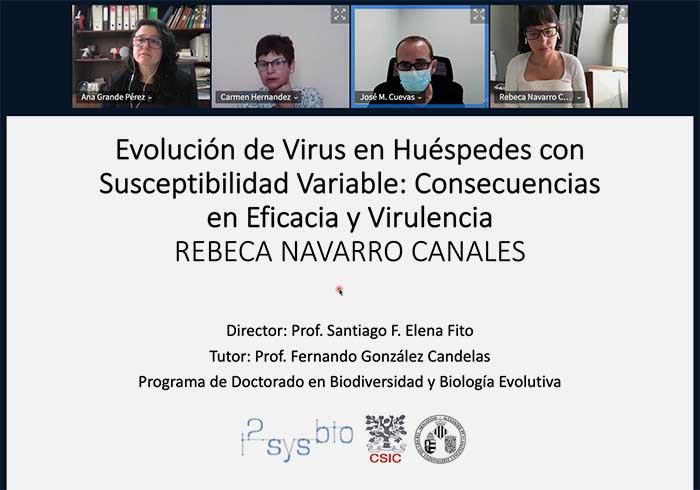
This doctoral thesis, supervised by Santiago F. Elena, analyses the evolutionary trajectories of viruses in response to the greater or lesser susceptibility shown by their hosts. Part of the research results have been published in the journal Europhysics Letters. The thesis was defended on 26 March 2021.
RNA viruses are among the most abundant emerging pathogens. During their normal life cycle, viruses move from one host to another, sometimes transmitted by air or water, or via vectors. Within an individual host, viruses face a diversity of cellular environments and immune challenges. Viruses maximise their Darwinian biological fitness by adapting rapidly to all these factors. We can assume that the interaction between host genotypes and pathogen genotypes moves between two extremes. On the one hand, one pathogen genotype can infect all host genotypes and there is a universally susceptible host genotype. At the opposite extreme, infection is not possible unless there is a very precise genetic identification between parasite and host. This approach has revealed that infection networks have a characteristic nested structure caused by the existence of generalist viruses that infect most hosts and very permissive hosts available to most viruses. In evolutionary terms, a host with reduced susceptibility to virus infection represents a strong selection on the virus population. In that case, background mortality is imposed on the mutant swarm, as most viral genotypes cannot replicate. Consequently, the effective population size is reduced, genetic drift becomes more important, and the fittest alleles are not necessarily fixed in the population. In hosts with higher susceptibility, the situation corresponds to weak selection, where most of the viral genotypes are viable and contribute to the next generation. The effective population size is large and selection is efficient in identifying the fittest genotypes.
The main objective of the thesis "Evolution of viruses in hosts with variable susceptibility: consequences for efficacy and virulence" was to study the evolutionary response of viruses to a range of host susceptibilities. To this end, patterns of evolution and diversification in turnip mosaic virus were studied in a collection of genotypes of the model plant Arabidopsis thaliana that differed in their susceptibility to the virus: a wild type and several mutants that had genes of the plant's resistance and defence pathways affected. The research shows that the rate of viral evolution depends on the susceptibility of the host and that generalist or specialist viral genotypes are generated depending on the degree of resistance or susceptibility of each local host.
Rebeca Navarro's thesis was carried out in the Evolutionary Systems Virology laboratory at I2SysBio under the supervision of Santiago F. Elena Fito (CSIC Research Professor, I2SysBio). The examining board was formed by Carmen Hernández Fort (IBMCP, CSIC-UPV), Ana Grande Pérez (University of Málaga) and José M. Cuevas Torrijos (I2SysBio), who qualified the thesis as outstanding.











